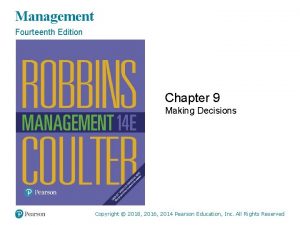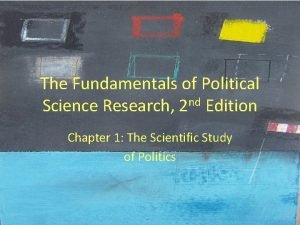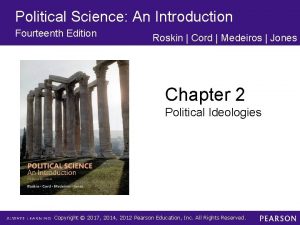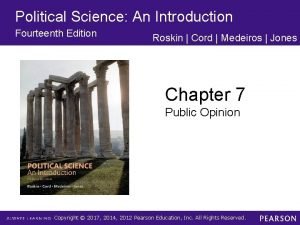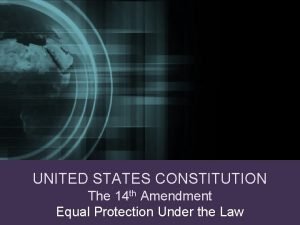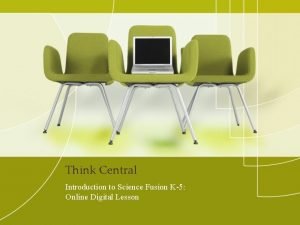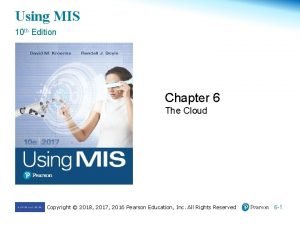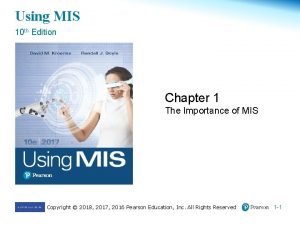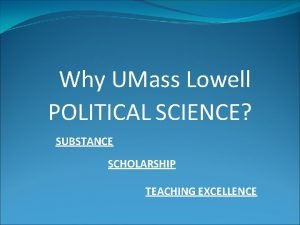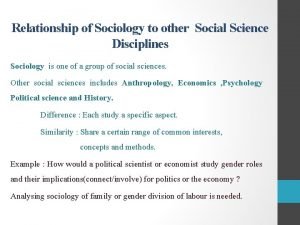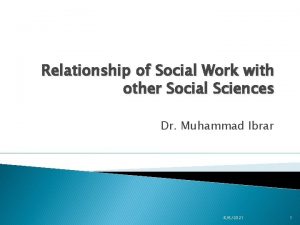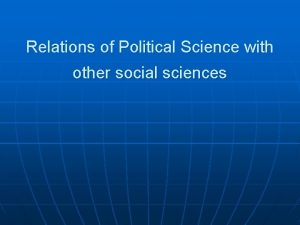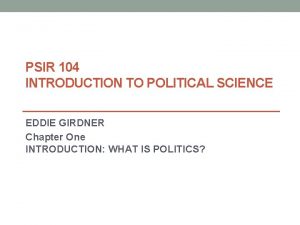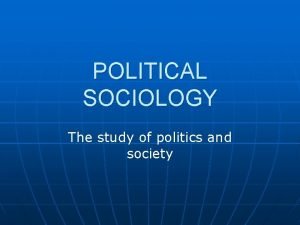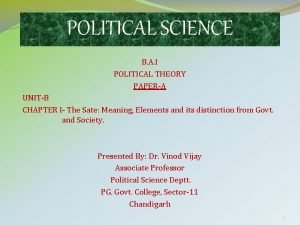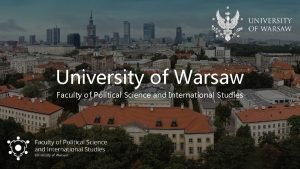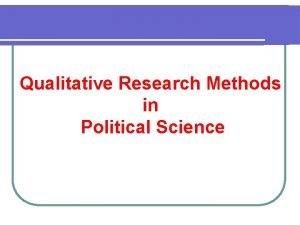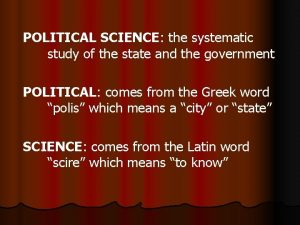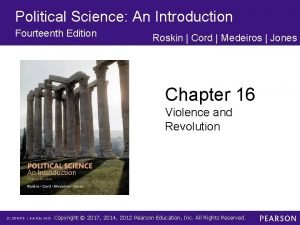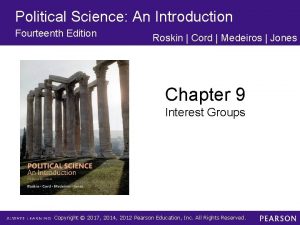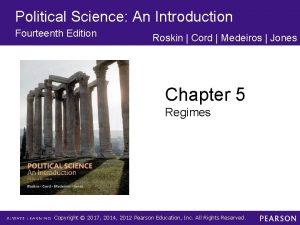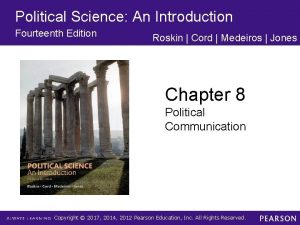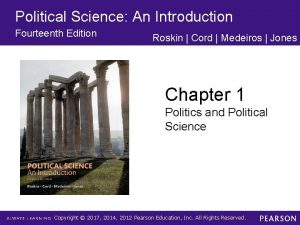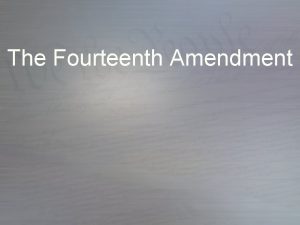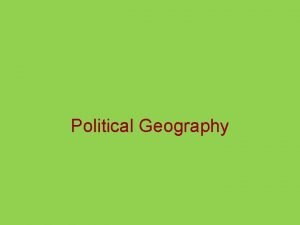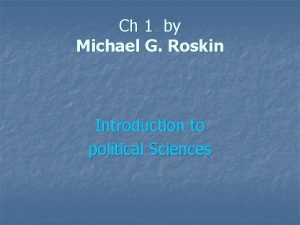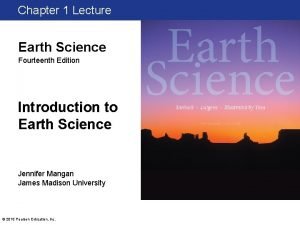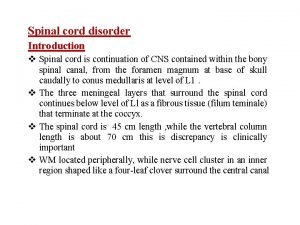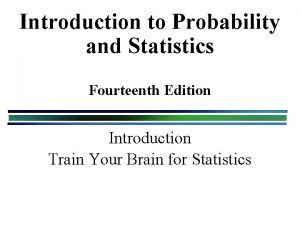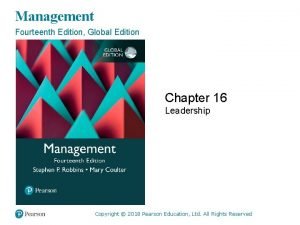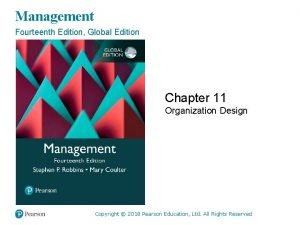Political Science An Introduction Fourteenth Edition Roskin Cord





















- Slides: 21

Political Science: An Introduction Fourteenth Edition Roskin | Cord | Medeiros | Jones Chapter 17 International Relations Copyright © 2017, 2014, 2012 Pearson Education, Inc. All Rights Reserved.

International Relations Introduction (1 of 2) • International relations differs from domestic politics due to anarchy in the international system. • U. S. foreign policy has moved between interventionism and isolationism and there is debate about the future direction of U. S. foreign policy. • Economics are incredibly important and many hope that greater world prosperity will promote peace. Copyright © 2017, 2014, 2012 Pearson Education, Inc. All Rights Reserved.

What Is International Relations? (3 of 5) 17. 1 Contrast domestic politics and international relations. • Sovereignty means that foreign powers have no ability to interfere with what happens within your borders. – Just because a nation is legally sovereign does not mean it controls its own turf, and sovereignty does not automatically preclude intervention. § Small countries are routinely dominated and influenced by more powerful countries. § When sovereignty is well-established it does bring internal peace, but when dealing with other countries states still do pretty much what they want, especially if there is a difference in power between them. Copyright © 2017, 2014, 2012 Pearson Education, Inc. All Rights Reserved.

Power and National Interest (1 of 5) 17. 2 Explain why national interests are often disputed. • Power is the ability of A to get B to do what A wants & is the basic element of intnl. politics and without sufficient power a state could not survive. – Power is not necessarily evil or aggressive; it is a tool of states to achieve outcomes in the international system. It differs from force, which is the direct application of military might. – Power is the general ability of a country to get its way and involves a range of factors including: military, cultural, economic, political, psychological. Copyright © 2017, 2014, 2012 Pearson Education, Inc. All Rights Reserved.

The Importance of Economics (1 of 4) 17. 3 Evaluate the economic factor in international relations today. • Economics looms large in contemporary international relations and everyone who studies IR should be an economist to some extent. – The big flaw, according to some, in the bipolar balance of power model was that it left out economics, which made it difficult for the model to accurately predict international relations. – Look at the relationship between the U. S. and China and the U. S. and Cuba. Economically, China has something the U. S. needs: Purchasing power and cheap labor. Cuba doesn’t have those resources. Copyright © 2017, 2014, 2012 Pearson Education, Inc. All Rights Reserved.

The Importance of Economics (4 of 4) 17. 3 Evaluate the economic factor in international relations today. • Globalization is the system in which goods, money, and ideas flow freely between countries. – The general motto of globalization is to make money, not war. – Globalization trend may be reversing, leading to deglobalization. • In the end, prosperity does not necessarily bring peace. Prosperity can actually be a source of conflict, not a preventer of conflict. Copyright © 2017, 2014, 2012 Pearson Education, Inc. All Rights Reserved.

Micro Theories • Causal explanations for war that are rooted in biology and psychology and seek to explain war as the result of genetic human aggressiveness. • Many scholars reject this as deterministic in addition to denying human agency. • Micro theories may offer some insight into the nature and sources of conflict, but fall short of actually explaining wars. – For example, if humans are naturally aggressive, then why aren't all countries constantly at war? Copyright © 2017, 2014, 2012 Pearson Education, Inc. All Rights Reserved.

Macro Theories (1 of 3) • Seek to explain war as a product of history, geography, and power by concentrating on the power and ambitions of states in the international system. • Hierarchy of power – Theorists reject balance of power theory, claiming that calculations of power are tough so it's hard to know when power is balanced in the system. Thus states are tempted to go to war when the power hierarchy is blurred. • Balance of power – This, the oldest and most commonly held theory, maintains that peace results when several states use national power and alliances to balance one another in the international system Copyright © 2017, 2014, 2012 Pearson Education, Inc. All Rights Reserved.

Misperception (1 of 2) • The study of misperception weaves micro and macro theories together by focusing on image or perception. – The psychological and real worlds bounce against each other in the minds of leaders. – In modern times, all countries see their actions as purely defensive, which is an issue of perception. § Iraq’s strategy of making Iran (and the rest of the world) believe they had WMD’s when in fact they did not. Copyright © 2017, 2014, 2012 Pearson Education, Inc. All Rights Reserved.

Keeping Peace World Government • World government is one way. If the problem is anarchy, get rid of anarchy through the imposition of a sovereign. – So why is there no world government? § The real culprit in conflict is sovereignty, the ability to go to war, which states refuse to give up. – Consequently, the United Nations is really a debating society. Copyright © 2017, 2014, 2012 Pearson Education, Inc. All Rights Reserved.

Functionalism (1 of 2) • Functionalism - Theory that cooperation in specialized areas will encourage overall cooperation among nations. • similar to what has happened in the creation of the European Union, is related to the idea of world government. – The goal is to have countries cooperate first in specialized, functional areas, such as weights and measures or coal and steel production. – This cooperation then spills over into other areas as well. § Cooperation evolves as a result. Copyright © 2017, 2014, 2012 Pearson Education, Inc. All Rights Reserved.

Diplomacy (1 of 2) • Diplomacy, the process of sending envoys from one state to another, is the oldest form of preserving peace. • Diplomacy is not easy and good diplomats know all the power factors and interests of the countries. – Consequently they can have suggestions for compromise that can leave both parties partly satisfied which can be ratified. – There is nothing to stop states from opting out of treaties they feel do not advance their interests. Copyright © 2017, 2014, 2012 Pearson Education, Inc. All Rights Reserved.

Peacekeeping (2 of 2) • Many people misunderstand peacekeeping. It is not making peace but keeping it and is related to third-party assistance by UN. There must be a peace in place to keep for it to be effective. – The disaster of UNPROFOR and its impossible mission illustrates this. – The success of IFOR due to enforcing a peace that had already been brokered. § IFOR and its robust rules of engagement are models for future peacekeeping, but only if peace exists beforehand. Copyright © 2017, 2014, 2012 Pearson Education, Inc. All Rights Reserved.

Third-Party Assistance • Third-party assistance is asking a party outside of the conflict for help in its resolution. • This can occur in many ways, such as: carrying messages back and forth; helping with issue clarification; and providing suggestions for compromise. – There must be a willingness to accept the assistance of third parties for it to work. Copyright © 2017, 2014, 2012 Pearson Education, Inc. All Rights Reserved.

Beyond Sovereignty? (1 of 2) 17. 6 Argue that the trend is now away from absolute sovereignty. • The end of the Cold War suggests that sovereignty may be slipping. International organizations do seem to have influence over the domestic affairs of states. – The IMF routinely tells states what to do. – International law no longer accepts sovereignty as a cover for crimes against humanity. § This began with the Nuremberg Trials after WWII and has been advanced with the articulation by the United Nations' Security Council in the Responsibility to Protect doctrine, which further weakens the notion of sovereignty. Copyright © 2017, 2014, 2012 Pearson Education, Inc. All Rights Reserved.

The United Nations • The United Nations could be the replacement for individual state sovereignty and has worked better since the end of the Cold War. • Still, it has some serious problems, most of which are linked to the importance of state sovereignty. – Permanent member veto power – Enforcement powers are weak. • As a result, the UN is still largely a "talking shop" for diplomats. Copyright © 2017, 2014, 2012 Pearson Education, Inc. All Rights Reserved.

The North Atlantic Treaty Organization (1 of 2) • The North Atlantic Treaty Organization is another option and many argue that NATO is the best defensive alliance ever created, as it used the notion of collective defense to allow the United States and Western Europe to act as a single defender against the Soviet Union. • NATO is still important but it is limited in scope and collective defense does not apply outside of the members. Copyright © 2017, 2014, 2012 Pearson Education, Inc. All Rights Reserved.

U. S. Foreign Policy: Involved or Isolated? 17. 7 Evaluate the present era of U. S. foreign policy in terms of interventionism. • U. S. foreign policy has historically swung between isolationism and interventionism. • interventionism: Policy of using military force overseas. • isolationism: U. S. tendency to minimize importance of outside world. • unilateralism: Doing things our way against the wishes of allies. • noninterventionism: A policy of not sending troops abroad. Copyright © 2017, 2014, 2012 Pearson Education, Inc. All Rights Reserved.

Cycles of U. S. Foreign Policy (1 of 2) • There are different types of cycles that have been identified by scholars – Hoffmann § Phases of withdrawal and phases of messianic romping. – Morgenthau § Indiscriminate isolationism and indiscriminate internationalism. – Perkins § Pacific feelings; rising bellicosity and war; postwar nationalism; back to pacific feelings. Copyright © 2017, 2014, 2012 Pearson Education, Inc. All Rights Reserved.

Cycles of U. S. Foreign Policy (2 of 2) • Since 2003, some have argued, the United States practices unilateralism, which is a go it alone mentality that has led to lost allies and a rejection of treaties that allies like. – Exercising too much power on the world stage could actually lead to a loss of influence. • Noninterventionism is different from isolationism, for where isolationism connotes ignorance, noninterventionism is a reluctance to use force overseas. Copyright © 2017, 2014, 2012 Pearson Education, Inc. All Rights Reserved.

The United States in a Dangerous World (3 of 4) • The biggest problem now is how to handle rising China, as historically, rising powers have tended to collide with the dominant power, leading to conflict. • Currently China's national interest is defined in terms of economic growth, not territorial expansion, but this could still change as China has a strong nationalist sentiment. • Not to mention Russian meddling in U. S. affairs Copyright © 2017, 2014, 2012 Pearson Education, Inc. All Rights Reserved.
 Management fourteenth edition
Management fourteenth edition The fundamentals of political science research 2nd edition
The fundamentals of political science research 2nd edition Political science 14th edition
Political science 14th edition Political science 14th edition
Political science 14th edition Fourteenth amendment
Fourteenth amendment Summer sun poem
Summer sun poem What is your favorite subject
What is your favorite subject Wwwk-6.thinkcentral
Wwwk-6.thinkcentral Using mis 10th edition
Using mis 10th edition Using mis 10th edition
Using mis 10th edition Uml political science
Uml political science Cyrus masroori
Cyrus masroori Difference between sociology and other social sciences pdf
Difference between sociology and other social sciences pdf Social work and other social sciences
Social work and other social sciences Relation between political science and economics
Relation between political science and economics External sovereignty
External sovereignty Relation between sociology and political science
Relation between sociology and political science Relation between political science and sociology
Relation between political science and sociology Fbla political science practice test
Fbla political science practice test University of warsa
University of warsa Qualitative research methods in political science
Qualitative research methods in political science Systematic study of state and government
Systematic study of state and government
